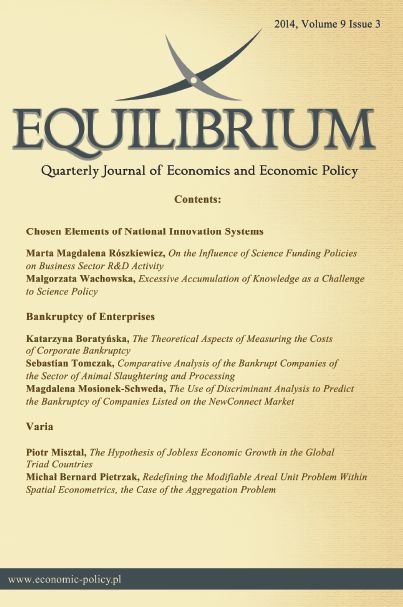Excessive Accumulation of Knowledge as a Challenge to Science Policy
DOI:
https://doi.org/10.12775/EQUIL.2014.016Keywords
excessive accumulation of knowledge, individual innovative productivity, teamwork, science policyAbstract
In response to current economic theories, a special emphasis is put on the need for continuous acquisition of knowledge. The stock of knowledge, however, is growing very dynamically, which leads to shifts in the scientific process. There are shifts in individual innovative productivity, which is manifested by the fact that the contribution of young scientists to science is getting smaller and – as a result of deepening of specialization – the dominance of teamwork increases. These two fundamental changes taking place in science should imply changes in the approach to science policy.
In the face of “ageing” of innovators, policy makers should put more emphasis on creating incentives for young people to enter scientific careers (higher wages in science, more attractive grants at the peak of scientific career; contrary to popular beliefs, grant systems should not be created specifically for young people). A measure increasing the interest in scientific careers could also be a shortening of education which, however, is difficult to achieve.
A response of science policy to the increasing dominance of teamwork should be (1) implementation of changes in the remuneration system for researchers, which should evolve from individual-oriented rewarding to team-oriented rewarding, as well as (2) implementation of changes in the evaluation system, which should be aimed towards team evaluation.References
Deo S., Wei Y.N., Daunert S. (2012), Probing a myth: does the younger generation of scientists have it easier?, “Analytical and Bioanalytical Chemistry”, Vol. 403, No. 8, http://dx.doi.org/10.1007/s00216-012-6083-7 .
Ding W.W., Levin S.G., Stephan P.E., Winkler A.E. (2009), The impact of information technology on scientists’ productivity, quality and collaboration patterns, NBER Working Paper, No. 15285.
Hall B.H., Jaffe A.B., Trajtenberg M. (2001), The NBER patent citations date file: lessons, insights and methodological tools, NBER Working Paper, No. 8498.
Jones B.F. (2008), The knowledge trap: human capital and development reconsidered, NBER Working Paper, No. 14138.
Jones B.F. (2009), The burden of knowledge and “death of the Renaissance man”: is innovation getting harder?, “Review of Economic Studies”, No.76, http://dx.doi.org/10.1111/j.1467-937X.2008.00531.x .
Jones B.F. (2010a), Age and great invention, “Review of Economics and Statistics”, Vol. 99, No. 1, http://dx.doi.org/10.1162/rest.2009.11724 .
Jones B.F. (2010b), As science evolves, how can science policy?, NBER Working Paper, No. 16002.
Jones B.F., Weinberg B.A. (2011), Age dynamics in scientific creativity, “PNAS”, Vol. 108, No. 47, http://dx.doi.org/10.1073/pnas.1102895108 .
Jones B.F., Wuchty S., Uzzi B. (2008), Multi-university research teams: shifting impact, geography, and stratification in science, “Science”, Vol. 322, No. 5905, http://dx.doi.org/10.1126/science.1158357 .
Levin S.G., Stephan P.E. (1991), Research productivity over the life cycle: evidence for academic scientists, “American Economic Review”, Vol. 81, No. 1.
Malone M. S. (1995), The microprocessor: a biography Springer-Verlag, New York.
Moore R.F., Pearson K., Wagner R.M. (2009), AIRI statistics. Trends in NIH awards, http://www.report.nih.gov (21.01.2013) .
Niklewicz-Pijaczyńska M., Wachowska M. (2012), Zdolność innowacyjna jednostki wobec natłoku wiedzy [in:] Adamczyk J., Hall H. (ed.), Zarządzanie – teoria, praktyka i perspektywy, Rzeszów: Oficyna Wydawnicza Politechniki Rzeszowskiej.
Stephan P.E., Levin S.G. (1993), Age and the Nobel prize revisited, „Scientometrics”, Vol. 28, No. 3, http://dx.doi.org/10.1007/BF02026517 .
Stern S. (2004), Do scientists pay to be scientists, “Management Science”, Vol. 50, No. 6, http://dx.doi.org/10.1287/mnsc.1040.0241 .
Teasley S., Wolinsky S. (2001), Scientific collaborations at a distance, “Science”, Vol. 292, No. 5525.
van Dalen H.P. (1999), The golden age of Nobel economists, “American Economist”, Vol. 43, No 2.
Wuchty S., Jones B.F., Uzzi B. (2007), The increasing dominance of teams in production of knowledge, “Science”, Vol. 316, No. 5827, http://dx.doi.org/10 .1126/science.1136099 .
Downloads
Published
How to Cite
Issue
Section
Stats
Number of views and downloads: 505
Number of citations: 0



